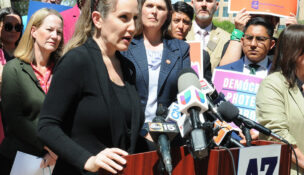Supreme Court to let AG argue case against regents
Howard Fischer, Capitol Media Services//September 15, 2021//
Supreme Court to let AG argue case against regents
Howard Fischer, Capitol Media Services//September 15, 2021//

The Arizona Supreme Court is going to give Attorney General Mark Brnovich one more chance to try to sue the Board of Regents over what he contends is an illegal deal to build a hotel and conference center.
In a brief order, the justices said they will hear his argument that he did not wait too long before challenging the arrangement as a violation of the Gift Clause of the Arizona Constitution. They also will allow him to argue that, timing or not, he has separate and independent authority to bring suit at any time against the regents for making a deal to evade taxes and for exceeding the board’s authority to enter into leases.
But even if he wins at the Supreme Court, that’s not the end of it. All that would do is allow him to go back to a trial judge to actually try to prove his claims.
The fight is over a plan to exempt from taxes a parcel that Arizona State University owns at the southeast corner of Mill Avenue and University Drive.
Construction already has started to build a 330-room Omni hotel and a 30,000-square-foot conference center. And there is a formal groundbreaking ceremony scheduled for September 17.
Brnovich says the deal amounts to a gift of public money.
He said ASU is paying $19.5 million to build the conference center even though the contract allows the school to use it without paying rent just seven days a year. And he said the school agreed to pay about $30 million to construct a 1,200-spot parking garage but will “gift” Omni 275 of the spots that the hotel gets to use exclusively and keep the revenue from the spaces.
And then there’s the issue that, by having the hotel built on property owned by the university, it escapes having to pay property taxes.
The deal does call for some “payments in lieu of taxes.” But Brnovich contends that still will leave local schools and governments short of what they would otherwise have received if the property were on the tax rolls the same as any other commercial property.
Attorneys for the regents have defended the policy they have approved to allow for such deals – and not just at ASU – saying it brings in money to help underwrite the costs of running the system.

Only thing is, Brnovich has never had a chance to make his case about the Gift Clause. Tax Court Judge Christopher Whitten ruled in 2019 that he waited too long after learning about the terms of the deal before filing suit.
That decision was upheld by the Court of Appeals.
Aside from the Gift Clause claim, the appellate judges noted that state law specifically empowers the regents to enter into leases for real and personal property.
The appellate judges also took a swat at Brnovich for trying to sue under a statute that deals with people holding office illegally. The attorney general, they said, was trying to use that to instead claim that the regents were illegally exercising that power.
There is one other issue that will be decided: whether Brnovich – meaning taxpayers – has to pay the legal fees of the private attorneys hired by the regents. Whitten already awarded nearly $1 million in fees from just the trial court proceedings.
It is unlikely the Supreme Court will hear the case before Thanksgiving.


















